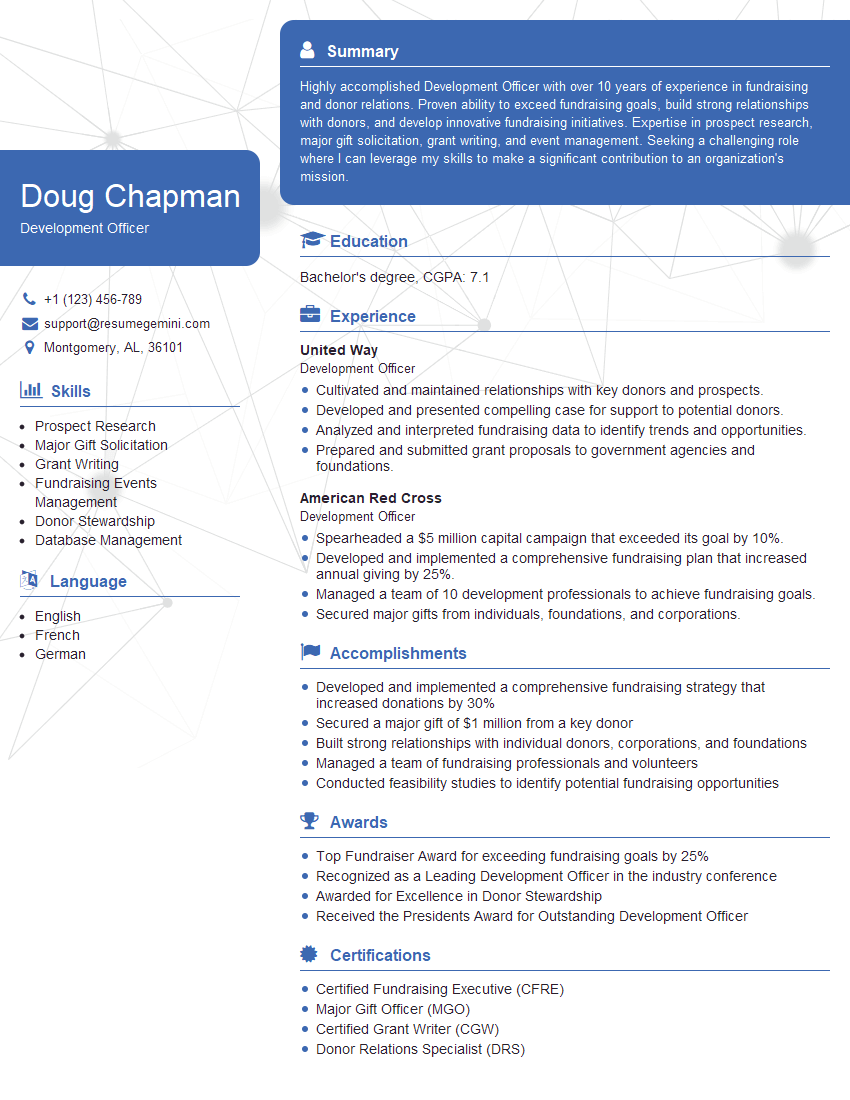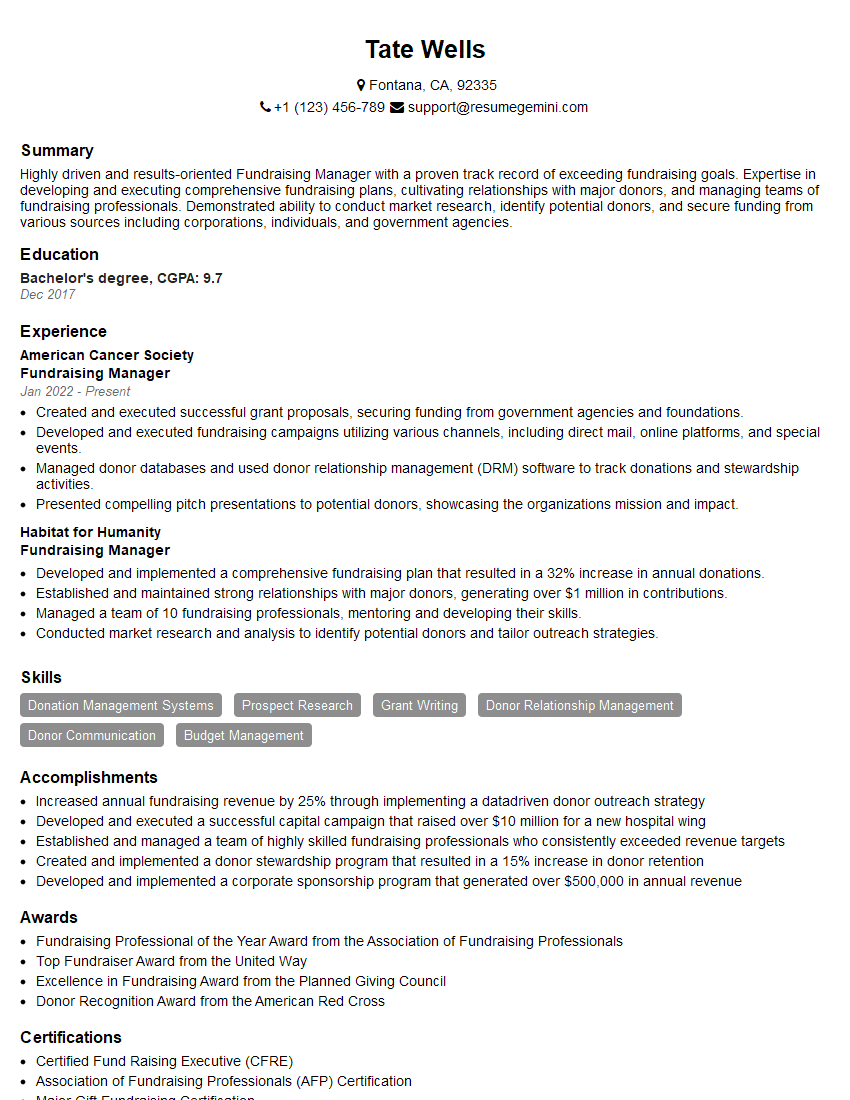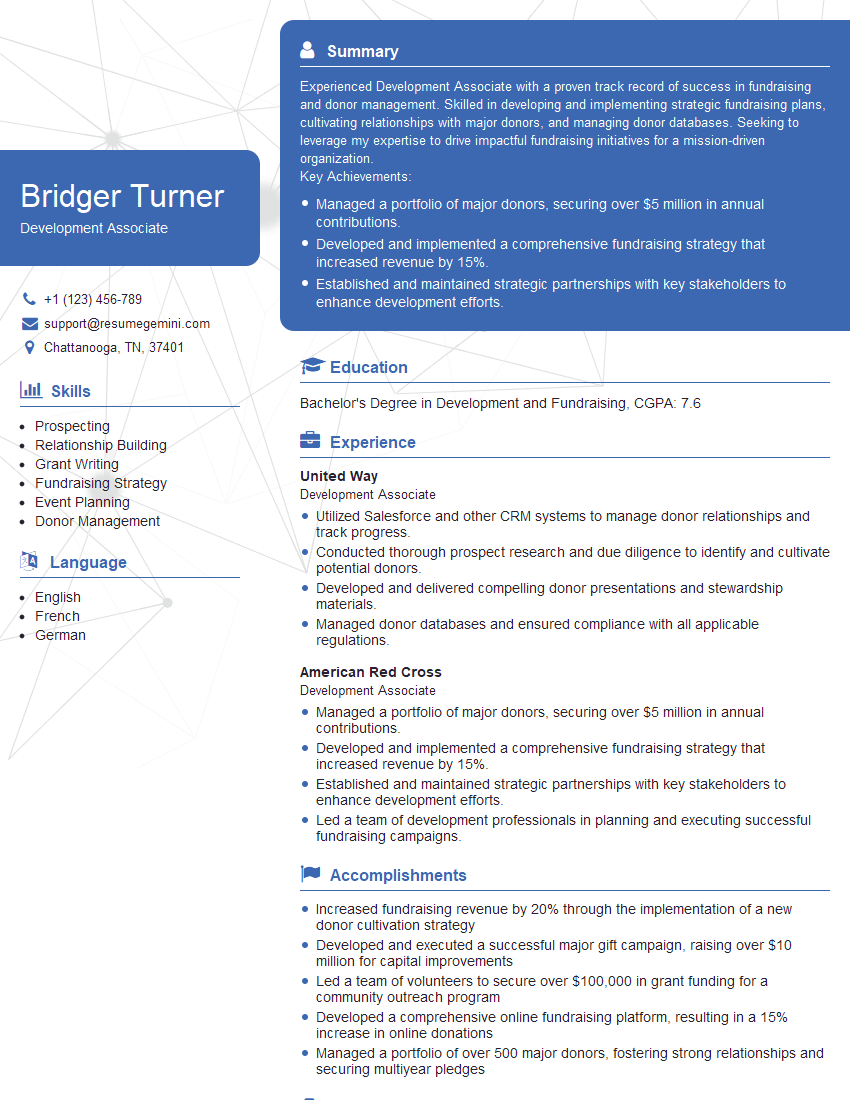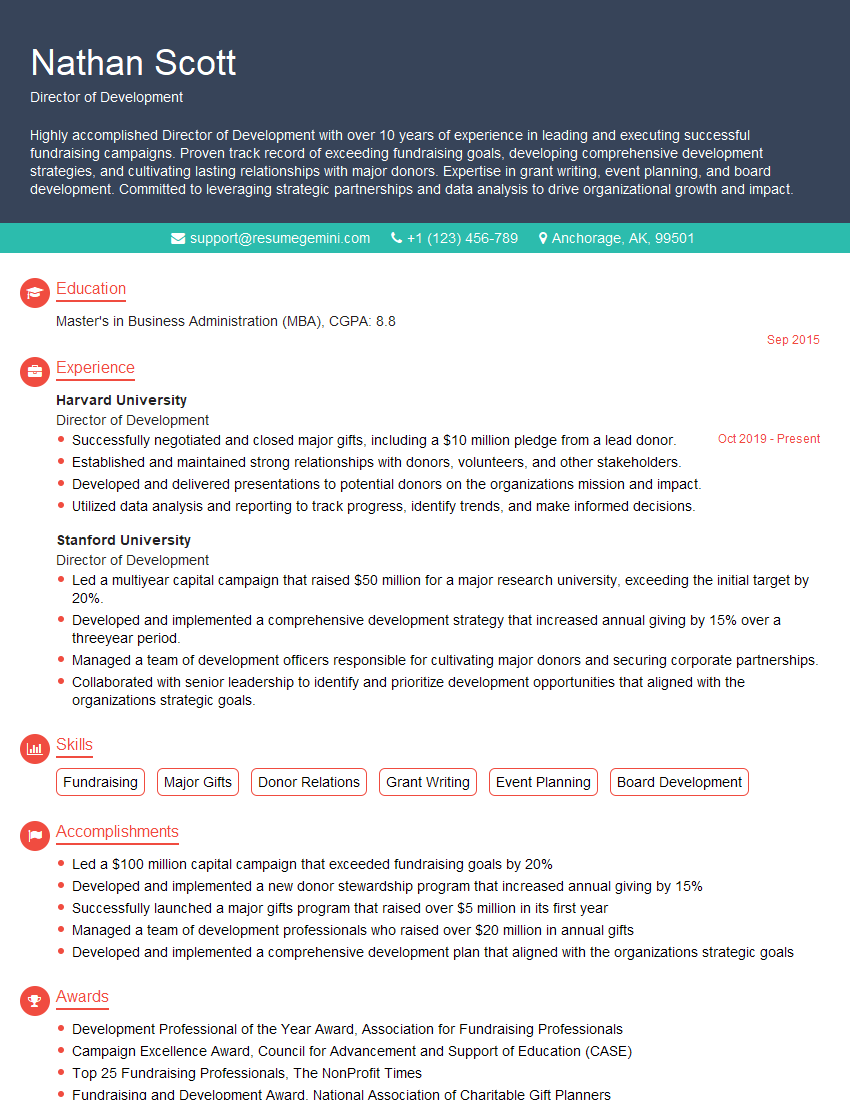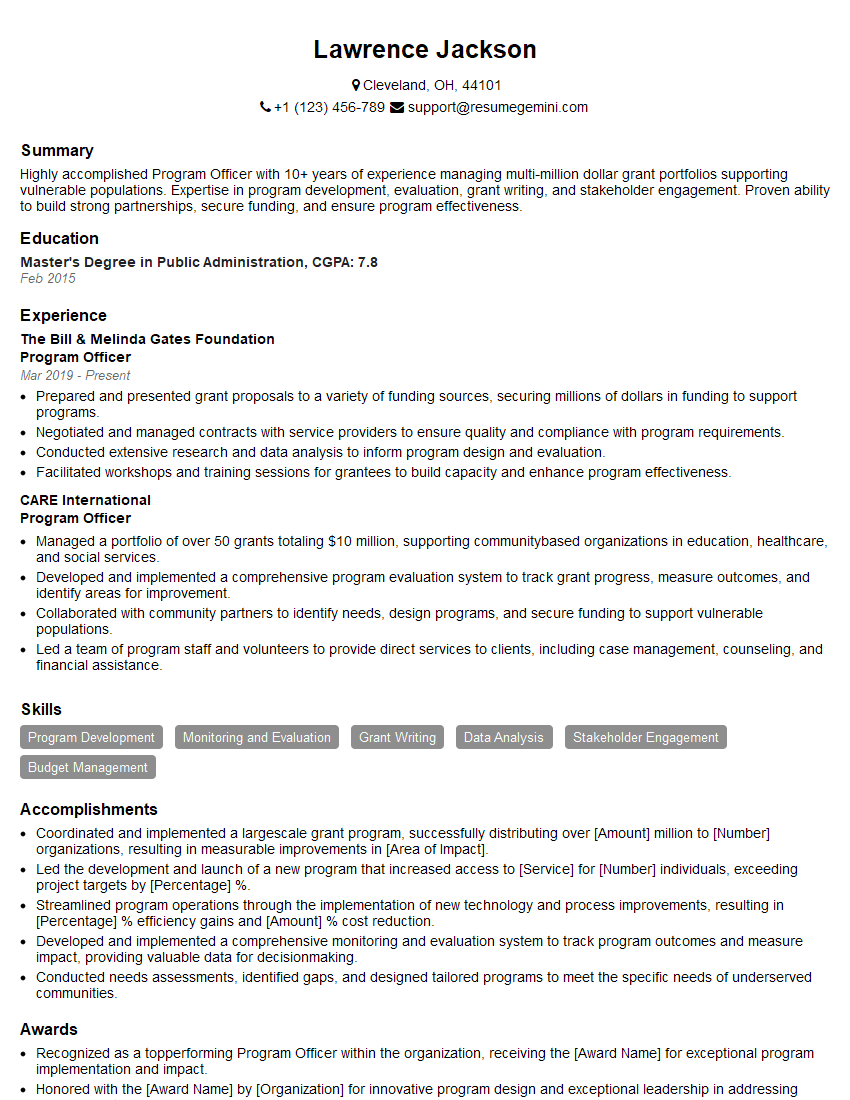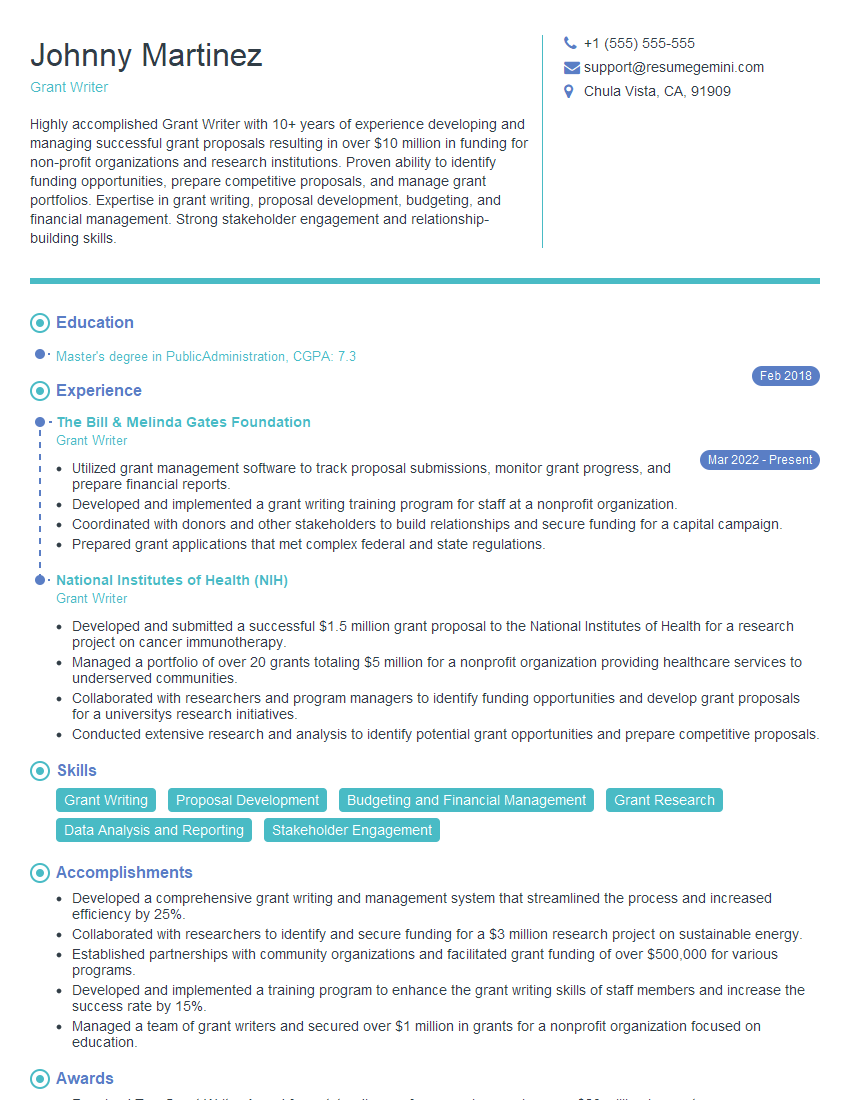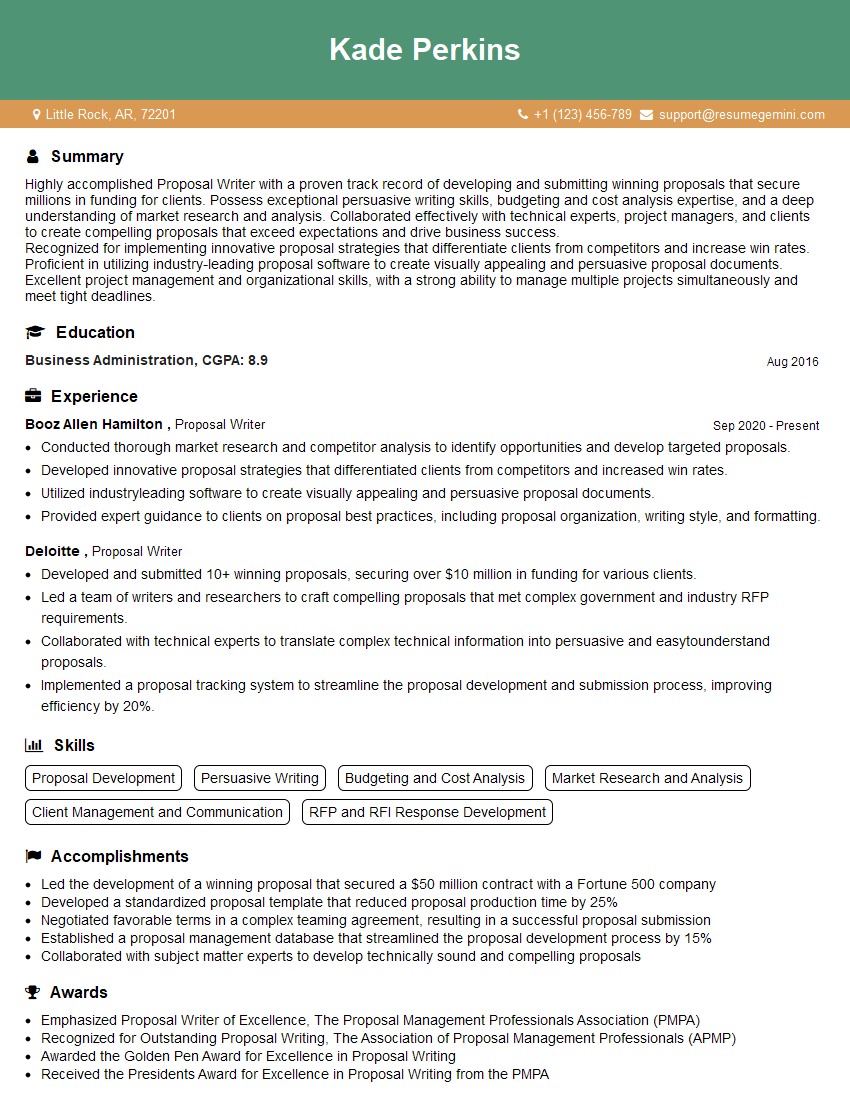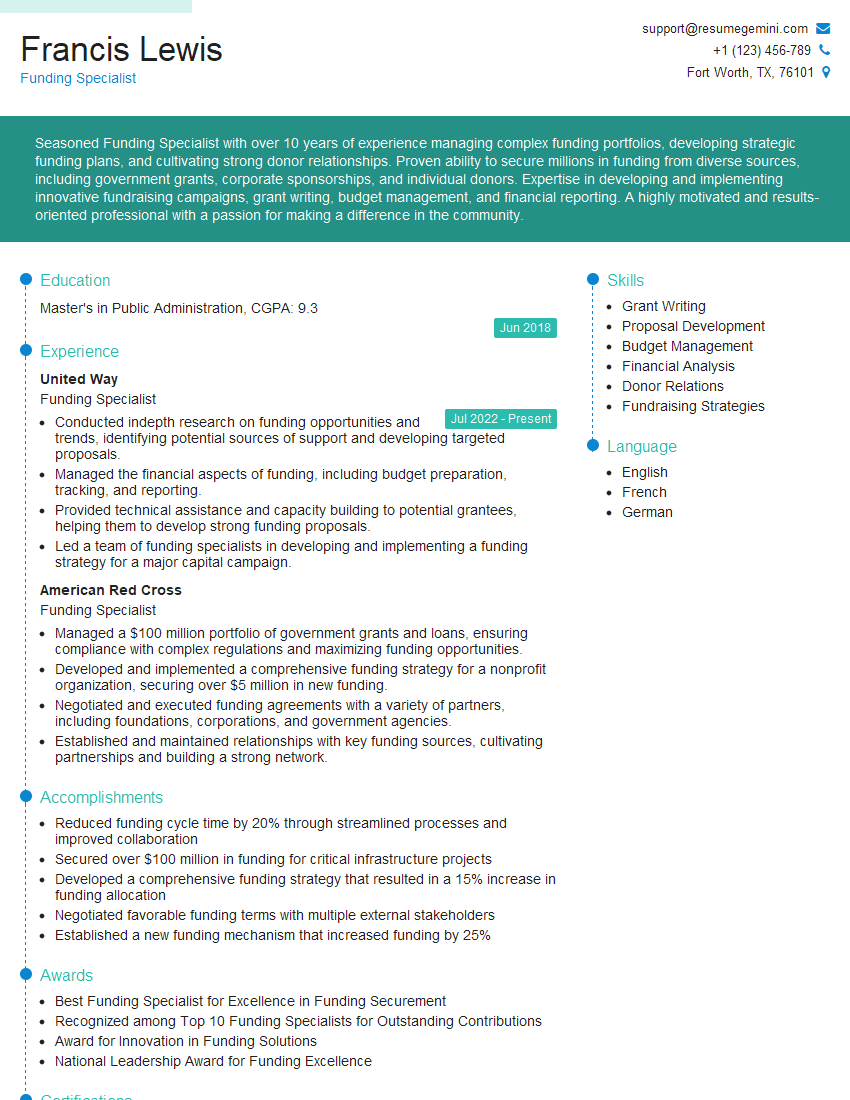Cracking a skill-specific interview, like one for Understanding of ethical considerations in grant writing, requires understanding the nuances of the role. In this blog, we present the questions you’re most likely to encounter, along with insights into how to answer them effectively. Let’s ensure you’re ready to make a strong impression.
Questions Asked in Understanding of ethical considerations in grant writing Interview
Q 1. Define ‘conflict of interest’ in the context of grant writing.
A conflict of interest in grant writing arises when a researcher or institution’s personal interests, financial or otherwise, could potentially compromise their objectivity or impartiality in the design, conduct, or reporting of research funded by a grant. This can include situations where the researcher stands to benefit personally from the grant’s success, regardless of its scientific merit.
For example, a researcher might own stock in a company whose product is being tested in the proposed research, or a close family member might be employed by the institution which is seeking the grant. Such scenarios could incentivize bias in data interpretation or research design, undermining the integrity of the grant application and the research process.
Q 2. Describe a scenario where you had to address a potential ethical conflict in a grant proposal.
In a previous project, we were applying for a grant to study the effectiveness of a novel drug in treating a specific disease. One of our team members, a highly respected scientist, had a minor, undisclosed financial stake in the company developing this drug. While the financial interest was relatively small and didn’t directly influence the research design, it posed a potential conflict of interest. We addressed it proactively by disclosing this interest fully in our grant proposal, explaining the measures we would take to mitigate potential bias. This included implementing rigorous, blinded data analysis and having an independent statistician review the findings. Transparency was key in maintaining the integrity of the application.
Q 3. Explain the importance of transparency in grant reporting.
Transparency in grant reporting is paramount to ensure accountability and public trust. It fosters a culture of honesty and allows funders to verify that the grant funds were used for their intended purpose. Transparency means openly sharing all aspects of the research process, including methodology, data, results (both positive and negative), and any unforeseen challenges or changes in the project’s direction. A lack of transparency can erode public confidence in research and funding organizations.
For instance, detailed financial reports, regular progress updates, and readily available publications are essential components of transparent grant reporting. It allows the public to assess whether the project achieved its objectives and whether the financial resources were spent effectively and ethically.
Q 4. How do you ensure the accuracy and integrity of data presented in a grant application?
Ensuring data accuracy and integrity is crucial for ethical grant writing. We employ several strategies: First, we adhere to rigorous data collection methods, employing standardized protocols and employing multiple researchers where feasible to minimize error and bias. Second, all data is meticulously documented, with clear descriptions of methods, analytical techniques, and any limitations. Third, independent verification methods, such as peer review of data and analyses by an independent statistician, are routinely employed to validate our findings. Finally, we utilize robust data management systems that protect against data loss or manipulation. This systematic approach ensures credibility and supports the findings presented in the grant application.
Q 5. What are the ethical implications of exaggerating project outcomes in a grant proposal?
Exaggerating project outcomes in a grant proposal has serious ethical implications. It constitutes scientific misconduct and undermines the integrity of the entire research enterprise. It misrepresents the potential benefits and could lead funders to allocate resources inefficiently. Moreover, such actions damage the reputation of the researcher, institution, and the funding body. Funding decisions are made based on the trust that researchers will present accurate data and projections. Exaggerating results breaches this trust and erodes the credibility of future grant proposals, not only from the individual but potentially from the whole organization.
For example, falsely claiming a higher success rate or impact than actual results would be a severe violation of ethical principles and could face significant consequences including retractions, funding cancellations, and reputational damage.
Q 6. How do you handle situations where a funder’s expectations conflict with ethical research practices?
Conflicts between funder expectations and ethical research practices are challenging but require careful navigation. Open communication is key. I would first try to understand the funder’s expectations clearly. Then, I would assess the degree of conflict: Is it a minor difference in approach, or does it compromise fundamental ethical principles (e.g., data fabrication or participant coercion)? If the conflict is minor, I would explore compromise options while remaining steadfast on maintaining ethical standards. However, if the funder’s expectations violate fundamental ethical principles, I would respectfully decline the funding or, depending on the severity, could report the issue through the appropriate channels within the funding organization.
Q 7. What steps would you take if you discovered a potential violation of ethical guidelines in a grant proposal?
Discovering a potential ethical violation in a grant proposal is a serious matter. The first step is to thoroughly investigate the situation, gathering all relevant information. If the violation is confirmed, I would immediately report it through the established channels within my institution (e.g., research ethics committee, compliance officer). Depending on the nature and severity of the violation, I may need to withdraw the application or amend it significantly to rectify the issue. Transparency and prompt action are vital to maintain integrity and prevent further harm. The steps might include documenting all findings, following institutional protocols, and cooperating fully with any investigations.
Q 8. Explain the importance of adhering to specific funder guidelines and regulations.
Adhering to a funder’s guidelines and regulations is paramount for several reasons. It’s essentially a demonstration of respect for the funder’s mission and priorities. Think of it like this: if you’re invited to a formal dinner, you wouldn’t show up in your pajamas; similarly, submitting a grant application that ignores the funder’s specific requirements shows a lack of professionalism and significantly reduces your chances of success.
Failure to comply can lead to immediate disqualification. Funders often have very specific formatting requirements, eligibility criteria, and reporting protocols. These aren’t arbitrary rules; they ensure fairness, transparency, and efficient use of funds. For example, if a funder requires a specific budget format, ignoring that and submitting a different one shows disregard for their process and may make it difficult for them to assess your proposal accurately.
Furthermore, compliance protects both the applicant and the funder from legal and ethical issues. Misrepresenting information or failing to adhere to reporting requirements can lead to serious consequences, including legal action, reputational damage, and the loss of future funding opportunities.
Q 9. How do you maintain confidentiality when dealing with sensitive information related to grant applications?
Maintaining confidentiality with sensitive information in grant applications is crucial. This includes protecting Personally Identifiable Information (PII), proprietary data, and research findings that are not yet publicly available. I have established strict protocols to safeguard this information. For example, I only access grant data through secure networks, using strong passwords and multi-factor authentication where available.
I use data encryption tools to protect sensitive files both in transit and at rest. Moreover, I strictly limit access to sensitive data on a need-to-know basis, sharing it only with authorized personnel directly involved in the grant application process. Any documents containing sensitive information are stored securely, either physically in locked cabinets or digitally in encrypted cloud storage.
Finally, I always ensure I’m complying with relevant data privacy regulations, like HIPAA or GDPR, depending on the nature of the data being handled. Regular training on data security and ethical handling of sensitive information is also a vital part of maintaining confidentiality.
Q 10. How do you ensure the fair and equitable distribution of grant funds?
Ensuring fair and equitable distribution of grant funds involves several key steps. It begins with transparent and clearly defined selection criteria. The criteria should be objective and measurable, eliminating bias and ensuring consistent application across all proposals. This might involve a points-based system, where specific criteria are weighted based on their importance to the funder’s goals. For example, a funder focused on community impact might heavily weigh criteria related to community engagement and demonstrable need.
A robust review process is also essential, preferably involving multiple independent reviewers to minimize personal biases. This reduces the chance of favoritism or prejudice and promotes objectivity. Reviewers should ideally have diverse backgrounds and expertise to offer a comprehensive evaluation of the proposals.
Finally, clear and well-documented decision-making processes ensure transparency and accountability. The rationale behind the funding decisions should be well-articulated, clearly explaining why certain proposals were selected over others. This also allows for constructive feedback to applicants, improving their chances of success in future funding applications.
Q 11. Describe your experience with grant compliance regulations (e.g., OMB Circulars, etc.).
My experience with grant compliance regulations, including OMB Circulars (specifically A-110, A-133, and A-21), is extensive. I’ve worked on numerous grants subject to these regulations, ensuring compliance through careful budgeting, rigorous record-keeping, and meticulous reporting. For example, I have experience in developing detailed budgets that adhere to the cost principles outlined in OMB Circular A-110, ensuring that all expenses are properly documented and justified.
I understand the importance of single audits for larger grants as per A-133, and I’m proficient in preparing the necessary reports and working with auditors. I’m also well-versed in the regulations surrounding indirect costs and cost allocation plans. I consider it my responsibility to stay current on any updates or changes to these regulations to maintain compliance and avoid any potential penalties.
These regulations are not just a set of rules to follow; they are critical for maintaining the integrity of government funding and ensuring accountability to taxpayers. My approach emphasizes proactive compliance rather than reactive problem-solving.
Q 12. How do you balance the need for securing funding with ethical considerations?
Balancing the need for securing funding with ethical considerations is a constant challenge. It’s not a matter of choosing one over the other; it’s about integrating ethical principles into every step of the grant writing process. This starts with a clear understanding of the funder’s mission and priorities. A proposal that misrepresents the project to align with a funder’s agenda, even if it increases the chances of success, is ethically questionable.
Transparency and honesty are key. A strong proposal presents the project realistically, acknowledging potential limitations and challenges. Inflating the potential impact or minimizing risks undermines ethical principles. For example, claiming a project will cure cancer when it only investigates a specific aspect of the disease is ethically problematic and risks undermining trust.
My approach prioritizes alignment between project goals and the funder’s objectives while maintaining integrity in the presentation of the project’s scope, impact, and potential outcomes. This approach prioritizes long-term reputation and trust over short-term funding gains. Ethical grant writing builds a strong foundation for future collaborations and success.
Q 13. What are some common ethical pitfalls in grant writing, and how can they be avoided?
Common ethical pitfalls in grant writing include plagiarism, data fabrication or falsification, and conflicts of interest. Plagiarism, even unintentional, can have severe consequences. It erodes trust and can lead to disqualification. To avoid this, meticulous referencing and proper attribution are essential. Always use quotation marks for direct quotes and properly cite all sources using a consistent citation style.
Data fabrication or falsification involves manipulating or inventing data to support a project’s claims. This is a serious ethical breach and can lead to legal repercussions. Rigorous data collection and analysis methodologies are vital to avoid such pitfalls. Furthermore, independent verification of data should be conducted whenever possible.
Conflicts of interest arise when personal interests might influence the grant application process. For example, if a researcher has a financial stake in a company whose product is being promoted in the grant proposal, that needs to be clearly disclosed. Transparency is paramount in avoiding such conflicts. Disclosing any potential conflicts of interest allows the funder to assess the situation and make informed decisions.
Q 14. How would you address allegations of plagiarism or fabrication of data in a grant proposal?
Allegations of plagiarism or data fabrication in a grant proposal are extremely serious. My first response would be to thoroughly investigate the allegations. This involves carefully reviewing the proposal, comparing it to potential sources for plagiarism, and verifying the data presented. If there’s evidence of wrongdoing, I would immediately take corrective action. This might involve revising the proposal to remove the plagiarized material or to correct the fabricated data, depending on the severity of the issue.
It is crucial to be fully transparent with the funder. I would promptly report the findings of the investigation to them, acknowledging any mistakes and explaining the steps taken to address them. Depending on the nature and extent of the plagiarism or data fabrication, retraction of the proposal might be necessary. In severe cases, the matter might require referral to relevant ethics committees or legal authorities.
Maintaining honesty and integrity throughout this process is crucial. Taking responsibility for any errors and collaborating with the funder to resolve the issue is the most ethical approach. This demonstrates commitment to upholding academic integrity and maintaining trust.
Q 15. Explain the importance of informed consent in research projects funded by grants.
Informed consent is the cornerstone of ethical research. It means that participants voluntarily agree to participate in a study after being fully informed about its purpose, procedures, risks, and benefits. This ensures respect for individual autonomy and prevents exploitation.
In grant-funded research, informed consent is paramount because grants often involve human subjects. Researchers must obtain legally and ethically sound consent, usually documented through a signed consent form. This form should be written in plain language, understandable by the participants, and should clearly outline their rights, including the right to withdraw at any time without penalty.
For example, in a study investigating a new treatment for a disease, informed consent would require explaining the potential benefits and risks of the treatment, the procedures involved, the confidentiality of their data, and their right to refuse participation or withdraw at any point. Failure to obtain informed consent can lead to serious legal and ethical repercussions, including project termination and reputational damage.
Career Expert Tips:
- Ace those interviews! Prepare effectively by reviewing the Top 50 Most Common Interview Questions on ResumeGemini.
- Navigate your job search with confidence! Explore a wide range of Career Tips on ResumeGemini. Learn about common challenges and recommendations to overcome them.
- Craft the perfect resume! Master the Art of Resume Writing with ResumeGemini’s guide. Showcase your unique qualifications and achievements effectively.
- Don’t miss out on holiday savings! Build your dream resume with ResumeGemini’s ATS optimized templates.
Q 16. How do you ensure the responsible use of grant funds?
Responsible use of grant funds necessitates meticulous budgeting, transparent accounting, and adherence to the funder’s guidelines. It’s not just about spending the money; it’s about demonstrating fiscal responsibility and ensuring that the funds are used exclusively for the approved research project.
This includes maintaining detailed records of all expenses, obtaining competitive bids for purchases whenever possible, and promptly addressing any discrepancies. Regular internal audits and external reviews by the funding agency can help to maintain accountability. For example, if a grant is awarded for purchasing equipment, all quotes must be kept on file, and the purchase must be justified in the project budget.
Misuse of grant funds, even unintentional, can lead to severe consequences, including the immediate termination of funding, the requirement to repay funds, and damage to one’s reputation. Open communication with the funding agency regarding any potential budget adjustments is crucial.
Q 17. How would you handle a situation where a colleague is engaging in unethical behavior in relation to a grant?
Addressing unethical behavior by a colleague requires a careful and measured approach. The first step involves documenting the unethical behavior with specific examples and evidence. Then, I would try to have a private conversation with my colleague to address my concerns directly, emphasizing the impact of their actions on the project’s integrity and the reputation of our institution. This conversation should be documented, and witnesses should be considered, if safe to do so.
If the conversation doesn’t resolve the issue, I would escalate the matter to my supervisor or the relevant ethics committee within the institution. Depending on the severity of the misconduct, this might involve reporting the incident to the funding agency, potentially leading to an investigation. The approach should always prioritize preserving the integrity of the research and upholding the ethical standards of the profession.
For example, if a colleague is fabricating data, this is a serious breach of ethical conduct that must be reported immediately. Ignoring such behavior would be a failure of my ethical responsibility.
Q 18. Describe your understanding of responsible conduct of research (RCR).
Responsible Conduct of Research (RCR) encompasses a broad range of ethical principles and practices that guide researchers in conducting their work with integrity. It includes honesty in data collection and analysis, proper attribution of authorship, ethical treatment of human and animal subjects, responsible data management, and avoiding conflicts of interest.
RCR training is essential for researchers at all levels to understand and apply these principles effectively. This training typically covers topics such as plagiarism, data fabrication and falsification, authorship disputes, responsible use of research materials and equipment, and the ethical implications of using technology in research. Adherence to RCR is crucial for ensuring the validity and reliability of scientific findings and protecting the public trust in research.
A simple analogy is building a house: RCR provides the blueprint and building codes to construct a sound, ethical, and credible structure, ensuring the house (research) is safe and reliable.
Q 19. What are the ethical implications of using proprietary information in a grant proposal?
Using proprietary information in a grant proposal without permission is a serious ethical breach and can have significant legal consequences. Proprietary information, which includes confidential data, trade secrets, and intellectual property, is protected by law. Its unauthorized use is a violation of these rights and could lead to legal action by the owner.
Before including any proprietary information, it’s crucial to obtain written permission from the owner. This permission should clearly specify the permitted use of the information and any restrictions. If permission is not granted, alternative approaches should be explored, such as using publicly available data or citing relevant published work. Using such information without permission is not only unethical but also jeopardizes the integrity of the grant proposal and the entire research process.
For example, using a company’s patented technology in a grant proposal without their consent would be a violation of their intellectual property rights and could result in severe legal repercussions.
Q 20. How do you ensure the sustainability of projects funded through grants?
Grant-funded projects often have a limited lifespan, so ensuring sustainability requires careful planning and consideration beyond the project’s immediate goals. It involves developing strategies to ensure the project’s impact continues after the grant funding ends. This could include creating training programs to build capacity within the community, establishing partnerships with other organizations, seeking additional funding sources, or developing self-sustaining business models.
Examples of strategies for sustainability might include transferring project ownership to a local organization, developing a user-friendly manual for the project’s outputs, or creating a long-term monitoring plan to track the project’s impact over time. The key is to build a project that is not only successful during the grant period but also capable of long-term impact.
Imagine a project that teaches sustainable farming techniques to a community. Sustainability would involve empowering local farmers to continue using these techniques after the grant funding has ended, perhaps by creating a farmer’s cooperative or linking them with local markets.
Q 21. Explain your understanding of intellectual property rights in the context of grant-funded research.
Intellectual property rights (IPR) refer to the legal rights granted to the creators of original works, including inventions, literary and artistic works, designs, and symbols, names, and images used in commerce. In grant-funded research, the ownership and management of IPR are vital considerations. The grant agreement usually specifies who owns the IPR generated by the research project – often, it is shared between the researchers and the funding agency.
Understanding these agreements is crucial to avoid disputes. Researchers must be aware of their institution’s policies regarding IPR and ensure compliance. They should also clearly define ownership and usage rights in collaboration agreements with other researchers or institutions. For example, a university might own the patent rights for an invention arising from grant-funded research, while the researchers retain rights to publish their findings.
Failing to address IPR issues clearly and upfront can lead to conflicts and costly legal battles. Clear communication and well-defined agreements are crucial to avoid such problems.
Q 22. How do you evaluate the ethical implications of a research project before submitting a grant proposal?
Evaluating the ethical implications of a research project before submitting a grant proposal is crucial. It’s not just about following regulations; it’s about ensuring the research is conducted responsibly and with integrity. My approach involves a systematic review, considering the potential impact on all stakeholders. This involves a thorough assessment of potential risks and benefits, considering:
- Potential harm to participants: This includes physical, psychological, social, or economic harm. For example, a study involving vulnerable populations requires extra scrutiny to minimize risks and maximize benefits. I would carefully consider informed consent procedures and data anonymization techniques.
- Data privacy and security: How will participant data be stored and protected? Will appropriate measures be in place to prevent breaches and unauthorized access? I would ensure compliance with relevant regulations such as HIPAA or GDPR.
- Conflicts of interest: Do any researchers have financial or personal interests that could bias the research? Transparency and declaration of any potential conflicts are paramount. I would proactively identify and mitigate any potential biases.
- Scientific validity and rigor: Is the research design sound? Are the methods appropriate for addressing the research question? A well-designed study is ethically sound because it avoids wasting resources and potentially misleading results.
- Beneficence and justice: Does the research offer potential benefits that outweigh the risks? Is the research design fair and equitable, ensuring that all participants are treated respectfully and that benefits are distributed justly?
Essentially, I conduct a preemptive ethical risk assessment, similar to a pilot study, but for ethics. This process informs the grant proposal itself, demonstrating responsible research practices to the funding body.
Q 23. Describe your experience with internal review boards (IRBs) or ethical review committees.
My experience with Institutional Review Boards (IRBs) and ethical review committees is extensive. I’ve served on several IRBs, both as a researcher submitting proposals and as a reviewer evaluating the ethical soundness of others’ work. The process typically involves submitting a detailed protocol that outlines the research methodology, participant recruitment, data collection procedures, and data analysis plans. The IRB carefully reviews these documents to assess risks and benefits to participants, ensuring that informed consent is properly obtained, and that appropriate safeguards are in place to protect participant privacy and well-being. I’ve been involved in situations where modifications to protocols were needed to address IRB concerns, demonstrating a willingness to collaborate and improve the ethical rigor of research. I’ve also reviewed proposals from colleagues, offering feedback and guidance based on ethical best practices and regulatory requirements. This experience has greatly enhanced my understanding of ethical review processes and instilled in me a deep commitment to research integrity.
Q 24. How do you ensure the accessibility of grant-funded projects to diverse populations?
Ensuring accessibility of grant-funded projects to diverse populations is paramount. It’s about achieving equitable participation and impact. My strategies include:
- Community engagement: Involving community members from diverse backgrounds in the design and implementation of the project is key. This ensures that the research is relevant to their needs and addresses their concerns. For example, using community health workers to recruit participants.
- Culturally sensitive materials: All project materials, including surveys and educational materials, should be translated into relevant languages and adapted to be culturally appropriate for all target populations. This ensures understanding and reduces bias.
- Accessible recruitment strategies: Employing various methods to reach diverse communities, including online platforms, community events, and collaborations with local organizations. This ensures that the study reflects the diversity of the population.
- Data collection and analysis that accounts for diversity: Using appropriate statistical methods to analyze data and to understand whether project outcomes are consistent across diverse populations. This identifies and addresses potential disparities.
For instance, in a health-related project, I would ensure our recruitment strategies actively engage with minority ethnic communities, offering materials in their native languages and utilizing trusted community leaders to build trust and participation. This is more than just checking a box; it’s about building genuine relationships and fostering inclusivity.
Q 25. How do you document your ethical considerations and decision-making processes?
I meticulously document ethical considerations and decision-making processes using a combination of methods. This documentation serves as an audit trail, ensuring transparency and accountability. My approach includes:
- Detailed IRB application and correspondence: Thoroughly documenting all communications and revisions related to IRB reviews.
- Ethical review meeting minutes: Recording all decisions made during ethical review meetings, including reasons for those decisions.
- Project logbook: Maintaining a comprehensive project logbook that includes ethical considerations and any challenges encountered. This could include notes on potential conflicts and how they were resolved.
- Data management plan: A detailed plan outlining procedures for data storage, access, security, and anonymization.
- Informed consent documentation: Maintaining clear records of informed consent obtained from all participants.
This systematic documentation not only demonstrates ethical commitment but also safeguards against potential issues. It’s crucial for maintaining the integrity of the research and building public trust.
Q 26. What strategies do you employ to prevent conflicts of interest?
Preventing conflicts of interest is critical for maintaining the integrity of research. I utilize several strategies:
- Proactive disclosure: I openly declare any potential conflicts of interest, including financial interests, personal relationships, or affiliations that could compromise objectivity. This includes financial relationships with companies whose products or services might be relevant to my research.
- Recusal from decision-making: If a conflict arises, I recuse myself from any decision-making processes that could be influenced by that conflict. For example, if I have a financial stake in a particular company, I would avoid participating in grant reviews that involve that company’s products.
- Independent review: Seeking independent review from colleagues or an ethics committee to ensure objectivity and mitigate bias. This helps provide a second pair of eyes to assess potential issues.
- Transparency in publications: Clearly disclosing any potential conflicts of interest in research publications, allowing readers to evaluate the potential influence of these conflicts on the findings.
My goal is to maintain absolute transparency and avoid even the appearance of a conflict of interest. This protects the reputation of my research and builds trust with the wider scientific community and the public.
Q 27. How do you manage expectations regarding grant funding and project deliverables ethically?
Ethically managing expectations regarding grant funding and project deliverables is essential. It’s about setting realistic goals, transparent communication, and accountable performance. I accomplish this by:
- Realistic budgeting and timelines: Developing a budget and timeline that are realistic and achievable, taking into account potential unforeseen circumstances and challenges. I avoid overpromising and underdelivering.
- Clear communication with stakeholders: Regularly communicating with funders, project partners, and collaborators, keeping them informed of project progress, challenges, and potential adjustments to plans. This includes proactively communicating if issues arise that might delay the project.
- Data-driven reporting: Providing regular, data-driven reports to funders and stakeholders, demonstrating progress and accountability. This transparent reporting fosters trust and allows for timely course corrections if needed.
- Contingency planning: Building flexibility into the project plan to address potential challenges and delays. This demonstrates foresight and preparedness in a way that is reassuring to stakeholders.
For example, I’ve worked on projects where unexpected challenges arose, requiring adjustments to the original plan. By openly communicating these challenges and proposing alternative solutions, I’ve maintained the trust of stakeholders, and we were able to navigate these difficulties successfully. Openness and honesty are key to ethical project management.
Key Topics to Learn for Understanding of Ethical Considerations in Grant Writing Interviews
- Transparency and Disclosure: Understanding the importance of fully disclosing potential conflicts of interest, funding sources, and any prior relationships with the granting organization. Practical application: Developing strategies for proactive disclosure in grant proposals and budget justifications.
- Accuracy and Honesty in Data Reporting: Maintaining rigorous standards of accuracy in data collection, analysis, and presentation within grant proposals and progress reports. Practical application: Implementing robust data verification processes and addressing potential inconsistencies.
- Intellectual Property and Authorship: Respecting intellectual property rights, properly citing sources, and acknowledging contributions from all involved parties. Practical application: Understanding copyright law and best practices for attribution in research grants.
- Responsible Use of Funds: Adhering to strict budgetary guidelines, providing accurate financial reporting, and ensuring funds are used solely for the intended purpose. Practical application: Developing a detailed budget justification and tracking mechanisms for monitoring expenditures.
- Avoiding Plagiarism and Fabrication: Understanding the serious consequences of plagiarism and fabrication in grant proposals and research. Practical application: Utilizing proper paraphrasing techniques and implementing strategies to avoid unintentional plagiarism.
- Ethical Considerations in Collaboration: Navigating ethical challenges in collaborative grant writing projects, ensuring fair credit and equitable distribution of responsibilities. Practical application: Developing clear collaboration agreements and communication strategies.
- Compliance with Regulations: Understanding relevant regulations and guidelines pertaining to grant writing and research ethics at the local, national, and international levels. Practical application: Staying updated on changes in regulations and seeking clarification when needed.
Next Steps
Mastering ethical considerations in grant writing is crucial for building a successful and reputable career in the field. Demonstrating a strong understanding of these principles not only ensures responsible grant management but also enhances your credibility and trustworthiness with funding organizations. To strengthen your job prospects, create an ATS-friendly resume that showcases your skills and experience effectively. ResumeGemini is a trusted resource that can help you build a professional and impactful resume tailored to highlight your expertise in ethical grant writing. Examples of resumes specifically tailored to this area are available through ResumeGemini to help guide your efforts.
Explore more articles
Users Rating of Our Blogs
Share Your Experience
We value your feedback! Please rate our content and share your thoughts (optional).
What Readers Say About Our Blog
These apartments are so amazing, posting them online would break the algorithm.
https://bit.ly/Lovely2BedsApartmentHudsonYards
Reach out at [email protected] and let’s get started!
Take a look at this stunning 2-bedroom apartment perfectly situated NYC’s coveted Hudson Yards!
https://bit.ly/Lovely2BedsApartmentHudsonYards
Live Rent Free!
https://bit.ly/LiveRentFREE
Interesting Article, I liked the depth of knowledge you’ve shared.
Helpful, thanks for sharing.
Hi, I represent a social media marketing agency and liked your blog
Hi, I represent an SEO company that specialises in getting you AI citations and higher rankings on Google. I’d like to offer you a 100% free SEO audit for your website. Would you be interested?
